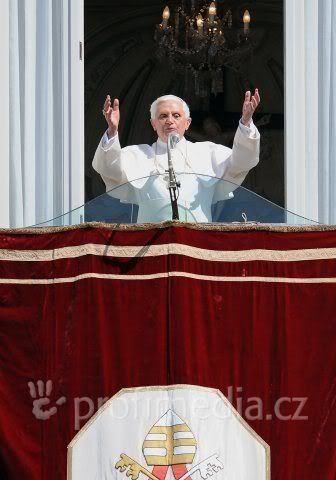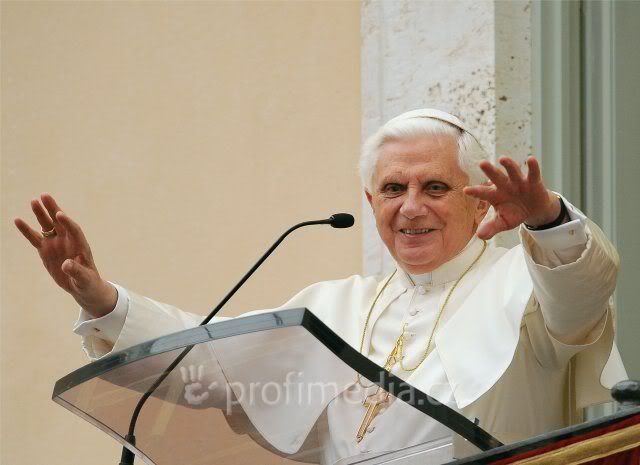 It is Wendesday so it is Pope's Wednesday Audience time. Since he has to stand at Castel Gandolfo these Wednesday Audiences and talks are abbreviated to say the least compared to those at the Vatican.
It is Wendesday so it is Pope's Wednesday Audience time. Since he has to stand at Castel Gandolfo these Wednesday Audiences and talks are abbreviated to say the least compared to those at the Vatican.The Pope was strangely silent on another Disaster of a Year of the Holy See receiving no medals at the Olympics. Perhaps this dealt with them having no team in the Olympics. Perhaps the Swiss Guard can put a team togther next year or a Priest Table Tennis team. If we have just held on the Papal States we would be rockin. I think a Crossing the Tiber Rowing Team or Swim Team would be awesome. Though I guess particpants for the rockin Female Beach volleyball games would be hard to come by. Fencing ? That seems very Vatican
However he talks about St. Bernard of Clairvaux, Mary the Virgin Queen, St. Rose of Lima , St Pius the X and how we are Called to be Saints!!!
Thank to the Ratzinger Forum for the translation and the pics from todays audience that are in the Italian Photo PAPA section.
 At 10:30 today, the Holy Father appeared at the balcony overlooking the inner courtyard of the Apostolic Palace for the Wednesday General Audience. The Holy Father recalled the saints commemorated by the Church this week.
At 10:30 today, the Holy Father appeared at the balcony overlooking the inner courtyard of the Apostolic Palace for the Wednesday General Audience. The Holy Father recalled the saints commemorated by the Church this week.
Afterwards, he also appeared on the balcony overlooking the town square of Castel Gandolfo to greet the overflow crowd that could not be accommodated inside. Then, he also greeted individuals and groups in the Swiss Hall of the Apostolic Palace. Here is a translation of his words.
Every day the Church offers for our consideration one or more saints and blessed ones to invoke and to imitate. This week, for example, we remember some who are particularly held dear in public devotion.
Yesterday, St. John Eudes, who - in the face of the rigorism of the Jansenists in the 17th century - promoted popular devotion whose inexhaustible source he identified as the Sacred Hearts of Jesus and Mary.
Today, we remember St. Bernard of Clairvaux, who was called by Pope Pius XVII the 'mellifluous doctor' because he excelled in "distilling the sense hidden in Biblical texts." This mystic, who said he wished to be immersed in the 'luminous valley' of meditation, was led by events to travel throughout Europe in the service of the Church, according to the needs of the time, and to defend the Christian faith. He has also been called the "Marian doctor' not because he had written much about Our Lady, but because he grasped her essential role in the Church, presenting her as the perfect model of monastic life as well as every other form of Christian life.
Tomorrow, we remember St. Pius X, who lived in a troubled historical period. Visiting his hometown in 1985, John Paul II said, "He struggled and suffered for the freedom of the Church, for which he showed himself ready to sacrifice privileges and honors, to face incomprehension and derision, in defending this freedom as the ultimate guarantee for the integrity and consistency of the faith" (Teachings of John Paul II, VIII, 1, 1985, p. 1818).
Friday will be dedicated to Mary the Virgin Queen, a commemoration instituted by the Servant of God Pius XII in 1955, and which, under the liturgical renewal following Vatican-II, is intended to be a complement to the Feast of the Assumption, since the two Marian distinctions are part of the same mystery.
Finally, on Saturday, we will pray to St. Rose of Lima, the first saint canonized for the Latin American continent, of which she is the principal patron. St. Rose liked to say, "If men knew what it is to live in grace, they would not be terrified of any suffering and they would gladly suffer any pain, because grace is the fruit of patience." She died in 1617, after a brief life of privations and suffering, on the feast of St. Bartholomew Apostle, to whom she was very devoted because he had suffered a particularly painful martyrdom.

Dear brothers and sisters, day after day the Church offers us the possibility to walk in the company of the saints. Hans Urs von Balthasar wrote that saints make up the most important commentary to the Gospel, being its realization in day-to-day life and therefore, for us, a true way of access to Jesus.
The French writer Jean Guitton described the saints as 'the colors of the spectrum of light', since each one, with his/her own tonalities and accents, reflects the light of God's holiness. How important and profitable it is to cultivate knowledge about the saints and devotion to them, alongside our daily meditation on the Word of God and filial love for Our Lady!
Vacation time certainly constitutes a useful time for picking up the biography and writings of a particular saint, but every day of the year offers us the opportunity to familiarize ourselves with our heavenly patrons. Their human and spiritual experience shows us that saintliness is not a luxury, not a privilege for the few, nor an impossible goal for the average man. In fact, it is the common destiny for all men called to be children of God, the universal vocation of all baptized Christians. Saintliness is offered to all. Of course, not all saints are equal.
They are, as I mentioned, the spectrum of divine light. Those who possess great charisms are not necessarily greater saints. There are certainly a great many whose names are known only to God, having lived on earth an apparently very normal life. And it is these 'normal' saints whom God wants. Their example shows that only when one is in contact with the Lord, then he can fill us with his peace and joy, and we become capable of spreading serenity, hope and optimism.
Considering the variety of charisms among the saints, Georges Bernanos, a great French writer who was always fascinated by the idea of sainthood - he cites many of them in his novels - observes that "every saint's life is like a new flowering in the spring." May this happen even for us! Let us allow ourselves to be attracted by the supernatural fascination of saintliness. May this grace be obtained for us by Mary, Queen of all Saints, Mother and Refuge of Sinners.
In his English greeting, he said:
I cordially greet all the English-speaking pilgrims present at today’s audience. I particularly welcome the altar servers from Malta —along with their families — who have been assisting at Saint Peter’s Basilica. I also greet a group of university students from Ireland. This week, the liturgical calendar celebrates several remarkable examples of holiness: Saint John Eudes, Saint Bernard of Clairvaux, Saint Pius X and Saint Rose of Lima.
The summer months provide an opportunity for us to read about the lives of these and all the saints, who show us that holiness is not the privilege of a few, but the vocation of all the baptized. Through their intercession and inspiration, may you learn to love and serve the Lord more ardently in your daily lives. God bless you all! This was his greeting to the faithful in the town square of Castel Gandolfo: Good day to you all.
This week, we celebrate the feasts of many saints. Today, St. Bernard of Clairvaux, a great Doctor of the Church, above all, in the veneration of Our Lady. He is a man who made peace and in that way showed us how to live the Gospel. Tomorrow, we honor St. Pius X who led the Church in a difficult period, renewed the liturgy, and therefore, renewed the Church from within.
Thus, all saints show us how to live the Gospel. They are a 'free interpretation' of the Gospel and they help us along our way. I wish all of you a good vacation and a good week. I thank you for your presence. My blessing goes to all of you.
All good wishes and arrivederci!

No comments:
Post a Comment